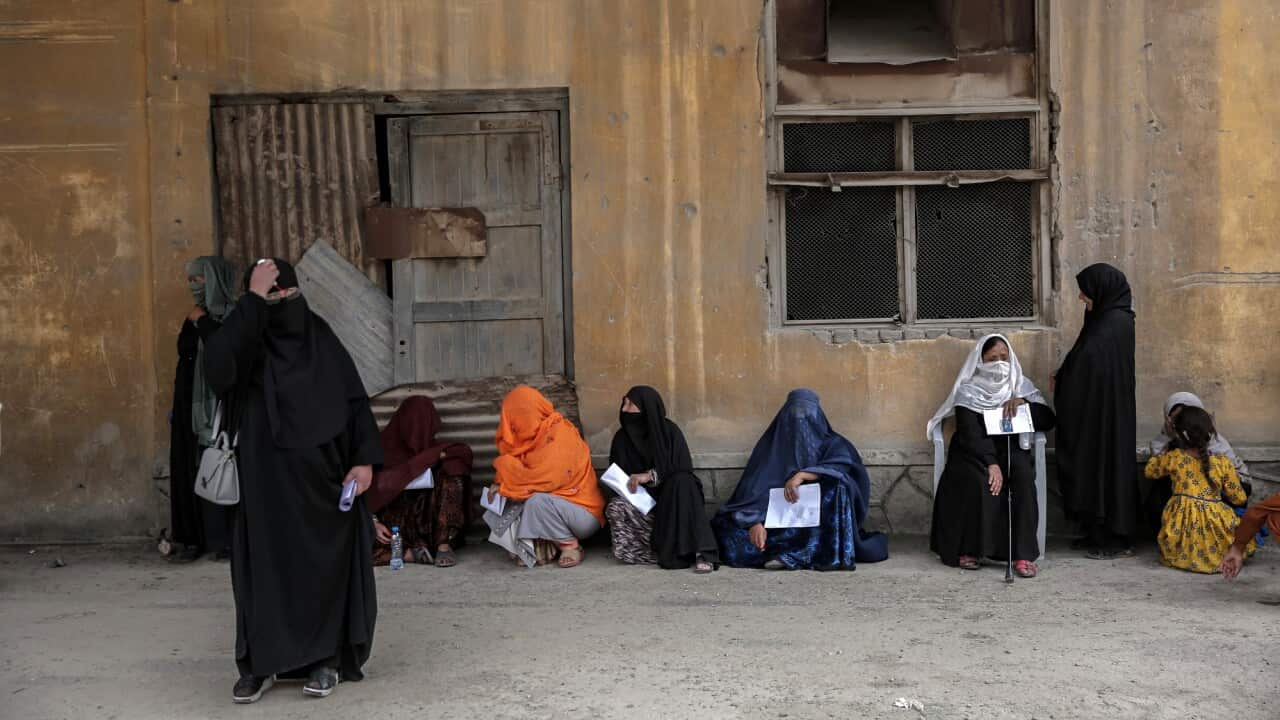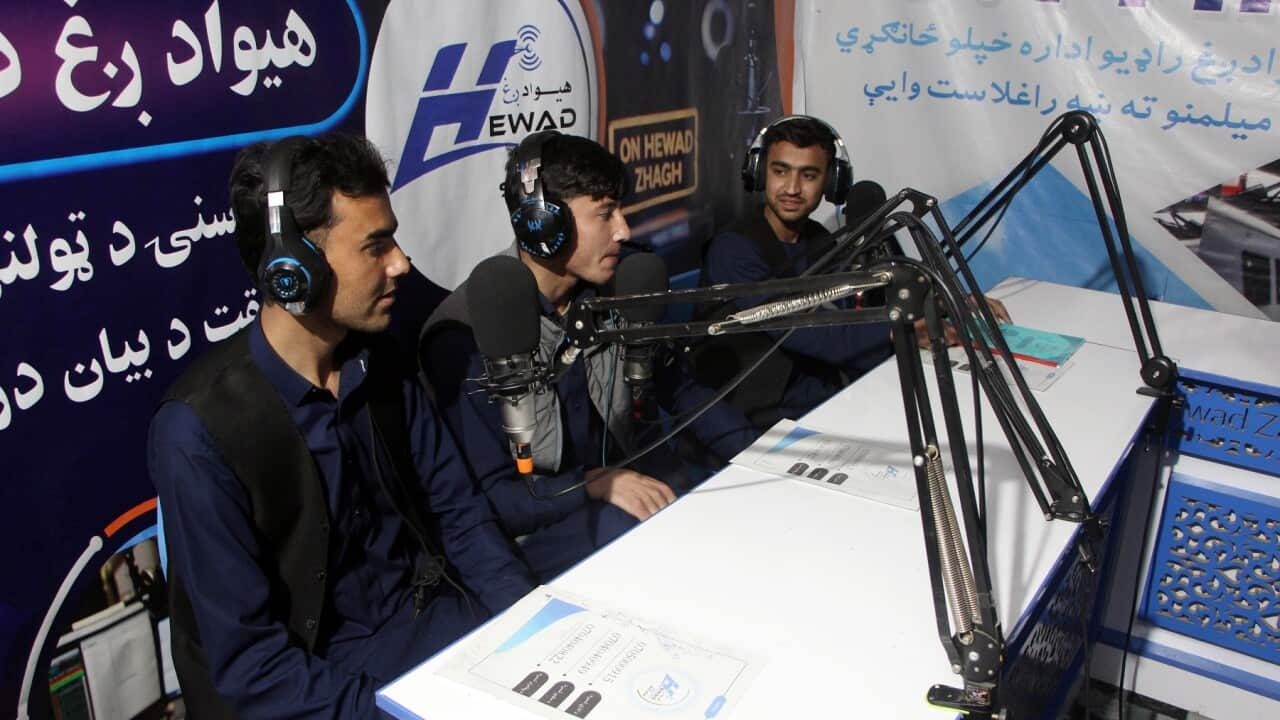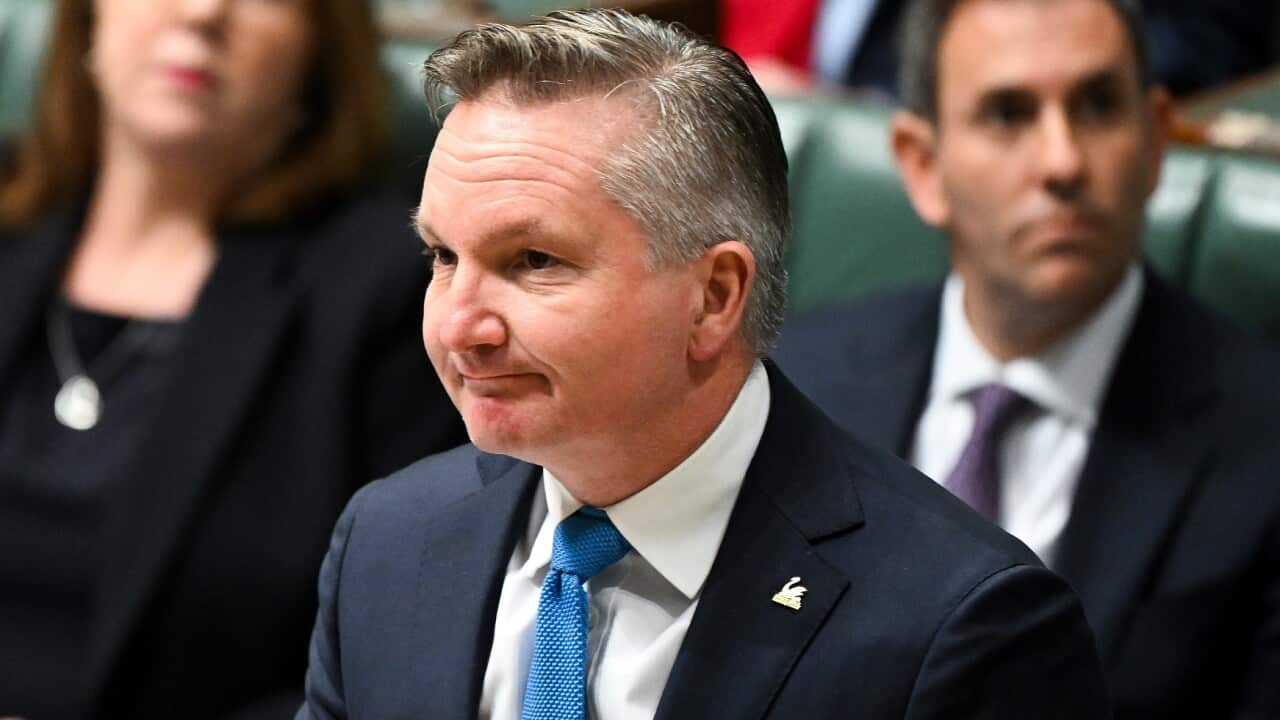Listen to Australian and world news, and follow trending topics with SBS News Podcasts.
TRANSCRIPT
"Before 2021, we had women pilots, women in the army, women doctors, women in the parliament, and women running for the presidential elections in Afghanistan. While currently we are talking is 2025, people might think that the speed of progress for women might have multiplied, but to be really honest, it has gone to stone age. Women are deprived of work, girls are deprived of schools, of universities."
That's Khalid Amiri, a former journalist for a state broadcaster in Afghanistan.
He tells SBS News about the situation for women in Afghanistan today, saying it has worsened since the country's capital city of Kabul was captured by the Taliban four years ago.
The United Nations says more than 78 percent of Afghan women are not in education, employment or training.
In its latest report, the UN Assistance Mission in Afghanistan says women's movements in public spaces is heavily restricted, with numerous cases of women being detained for allegedly breaching the dress code requirements.
A Taliban spokesperson, Zabiullah Mujahid, told SBS Pashto, the Taliban takes a different view.
"Women have now found a place for themselves that was their rightful Sharia-based right, from which they had been deprived for many years. Nowadays, they have access to it, they can easily obtain their rights, make their own decisions and determine their own destiny in life."
Since seizing power in 2021, the Taliban authorities have reinstated a ban on females accessing education after sixth grade.
Mr Mujahid says the Taliban is still considering ways to change the education curriculum to better align with Islamic principles and Afghan culture.
"It was initially stated that this is a temporary decision and that the needs would be assessed. We want to find a way that respects our Sharia principles and also achieves consensus in society."
As Afghanistan emerged from a civil war, from 1996 to 2001, the Taliban controlled most of the country, imposing their interpretation of Sharia or Islamic religious law.
In 2001, it was removed from power by a US-led invasion, but retook control when US forces left 20 years later - in 2021.
Ever since, it has sought international recognition.
In July this year, Russia announced itself as the first country to formally recognise the Taliban government in Afghanistan.
Mr Mujahid says it understands the role of diplomacy.
"But when you are not recognised by anyone and the diplomatic door is closed and then they have demands, it is not effective. We value our relations with Australia. We seek good relations with this country, with the Australian nation and with the Afghans residing in Australia. Consular services should be provided responsibly to the Afghan community living in Australia."
An independent UN investigator on human rights in Afghanistan, Richard Bennett, delivered a report to the UN General Assembly earlier this month in which he says the legal and judicial system are being used to oppress women and girls.
He cited actions like the suspension of laws protecting women and girls, including a landmark law that criminalised 22 forms of violence such as rape and forced marriage.
Maryam Zahid is the CEO of Afghan Women On the Move, a group that focuses on empowering women through digital and financial literacy, women's health advocacy and employment.
"I came as a refugee myself 26 years ago and when I arrived in Australia under Women at Risk Program - and it has been 30 years that I was forced to leave Afghanistan. So it's been a long time for me to say it with confidence and say it telling the truth of how much the systematic barriers and the outdated laws and policies that looked at the refugees, especially women."
She describes the situation back home.
"Since the fall of Kabul and how much the patriarchal society now, it's kind of dominating the rights of women in Afghanistan. It's not as easy as we wish to kind of work with them. Even behind the scenes, even sending them money. It's quite risky for them to go and pick up money regardless of which terms we kind of send them."
She says safety is a key issue - and there are risks from the misuse of artificial intelligence and social media that have put women in Afghanistan in danger.
"Those images used against these women. And there were some even they were reported to Taliban and Taliban directly went and found them and yeah, they get warnings and they get abused."
She says leaders in Australia should put their words into action.
"Leaders should go beyond issuing statements. They should stand in solidarity with Afghan women. It's kind of sad to see that we are ignoring half of the population in a country, but also the diaspora that also women like me experienced Taliban. And we know the impact of those type of trauma that lasts with you forever."
Khalid Amiri was a broadcast journalist in his home country - and now resides in Melbourne.
He says he has not forgotten what life was like in Afghanistan that forced him to flee in 2021.
"On 15th of August, Kabul fell to the Taliban and it was the worst nightmare that came true for all of us. And it was the biggest definition of betrayal by the international community towards the Afghans. How they threw Afghans to a regime that was killing them. And now this regime came into power and the entire international community was like: 'oh, we packed up our bags and we are leaving and the Afghans know what to do with it'."
He says he is affected by survivor's guilt - wondering why he was able to escape the situation, but others still struggle to leave the country.
"Why is the international community not listening to the plea of those Afghan girls left in Afghanistan? With my family that I speak to every day, to be really honest, it's not a brighter picture or it's not a positive picture that I get on daily basis from them. Particularly with the younger ones, they don't see a future for their self. Every youngster you meet is trying to find a way to leave the country."
He says for those who can't make it to western countries, they are compelled to go to the neighbouring countries including Pakistan and Iran where they could face severe torture from the police.
Mr Amiri says Iran has been sending back refugees to Afghanistan, which is another issue for the people who escaped the Taliban reprisals.
"And the thing that makes us very upset is the deafening silence of world leaders. All we see is just a few tweets coming up on social media from them of condemnation. While there are no concrete steps being taken."
Patrick Ryan is an independent humanitarian advocate for the former Afghan locally engaged staff of the Australian Embassy in Kabul.
He used to be the facilities manager there.
Mr Ryan says he was very pleased when DFAT reached out to him last year to help with the verification of some of their contracted employees that worked at the Australian embassy.
"Since Australia made its intention to vacate the embassy in Kabul in May 2021, I began a fairly sustained advocacy campaign that ran for six months that involved assembling a delegation of representatives for the contracted employees at the embassy to organise their colleagues to make Afghan LEE ((Afghan Locally Engaged Employee Program)) applications to the Department of Foreign Affairs and Trade."
The LEE program was established by the Australian government in 2012 as a pathway for priority processing for humanitarian visas for Afghan nationals who were employed with the Australian government in Afghanistan; and are at risk of harm due to their employment.
It closed in May last year, but outstanding visa applications are still being processed.
Since 2012, the program has helped more than 2,500 Afghans and their families to arrive in Australia.
Mr Ryan says he understands there are 13 people he is helping who remain either stranded in Afghanistan or in third countries awaiting an outcome - and much more needs to be done to ensure their safety.
"The Senate inquiry and the review of the immigration instrument 12 1 27 has taken nearly three years. During that time there's been no processing of anyone under any of the contracted employees under the Afghan LEE [[locally engaged employee]] special humanitarian visa program. And now we're seeing amendments made by the Albanese government excluding some of the people who may have previously been eligible for that program."
He says he knows of two people awaiting a visa outcome who were in Tehran after attending the embassy for biometric and medical checks, when a missile attack took place.
"They then came under attack during the conflict between Iran and Israel. Some of them had to make lengthy journeys on foot to get out of Tehran and had to go back into Afghanistan into hiding whilst waiting for their visas."
But he says there is still hope.
"I'm very happy that our youngest member of staff, who I'll just call ‘Khader’ at the moment to protect his identity, is going to be arriving in Adelaide later this month, nearly four years after the fall of Kabul. He was only 14 years old when he worked at the embassy as an apprentice painter. He's since gained his degree in engineering at Kabul Polytechnic, and he's going to be settling with relatives in Adelaide soon."
He says it's really important for the Australian government and Department of Home Affairs to make sure that Afghan LEE visa processing is expedited.
"I'm rather hoping that the government will streamline this process so there can be expedited for people who are still here four years out, so deserving of Australia's protection for the service they gave us in Afghanistan during our 20 year occupation."













